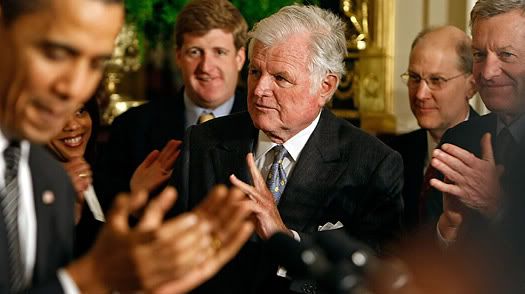I have waited to write this diary because I knew I needed to cool off. The health care debate has been a rollercoaster for months now, and the up-down-left-right topsy-turvy nature of the whole ordeal has been turning my stomach for a long time. Over the months, we’ve been bombarded with a dazzling and dizzying array of mixed messages. I’ve allowed myself, at times, to become as hysterical as the worst alarmists in the blogosphere, and just yesterday morning, I was ready to get up in front of all of you to curse Reid, condemn Obama, and prophesy doom. (Not my finest moment, admittedly.) But as I examine and reexamine the dialogue on this issue, my moods and thoughts are as wildly mercurial as the volatile health care debate itself. I have been torn and troubled all along, but the latest news from the Hill has me more perplexed and conflicted than ever. More mixed messages, more obstruction, more disputes — more infighting, alarm, compromises, concessions: A sea of contradictions, contravention, and confusion, well-poised to overwhelm and unravel even the steadiest among us.

So how do we navigate these roiling waters?
News (and mass hysteria) broke Tuesday night when Senate Majority Leader Harry Reid (D-NV) announced that he and other key Senate Democrats had reached a compromise on the health care bill by killing the public option:
Under the compromise developed by a group of conservative and liberal Democrats, the Senate legislation would no longer include a new government-run insurance program, or “public option,” for Americans who do not get coverage through their employers.
Instead, the government would essentially contract with a nonprofit insurer to provide a nationwide plan that would serve as the public option, according to officials briefed on the discussions. Combined with a vote earlier in the day that rejected efforts to tighten restrictions on public money for abortion, the compromise kept the Senate moving toward Reid’s goal of voting on the healthcare bill before Christmas.
I heard this… and saw red. After all the work Pelosi and other House Democrats had done to see that their version included a public option, and Reid was just going to drop it in the Senate? It took me awhile to cool down, but for those of us who are/were angry, there are several things to keep in mind. First of all, most of us didn’t want a public option — we wanted single payer. But most of us also knew that Dennis Kucinich could never win a general election, so we voted for candidates who weren’t running on that platform to begin with. In lieu of single payer, we wanted a strong (I’m sick of the word “robust”) public option that would give people a viable alternative to private health insurers. But we didn’t get that with H.R. 3962, did we? What we got was a cluttered bill containing a weak public option which wouldn’t be available to many of the people who so desperately need it. Despite its flaws, many of us accepted the bill as progress and applauded its passing, with the hope that it would, if nothing else, serve as a foundation upon which to build a better system and, ultimately, a stronger public option.
But in losing the public option as it stood in the House, how much are we truly sacrificing? How many did they figure that weak sauce public option would really cover? Roughly around 2 percent? And some worried that it might in fact benefit private insurers? So… a starting point — that’s all it really was.
From the NYT:
To satisfy liberal Democrats, like Senators Sherrod Brown of Ohio and John D. Rockefeller IV of West Virginia, the agreement calls for creating a new menu of national insurance plans, modeled after those offered federal workers, including members of Congress, and their dependents – more than eight million people.
The new, nonprofit insurance plans would be overseen by a well-established federal agency, the Office of Personnel Management, which now runs the Federal Employees Health Benefits Program and negotiates prices and benefits packages with private insurance companies. Private firms eagerly participate because of the large customer base.
According to this potential compromise,
Low- and moderate-income people who selected the nonprofit plan in a new insurance exchange would qualify for subsidies, just as they would if they selected a commercial plan.
The government would oversee the nonprofit plan, ensuring that it met basic standards for quality and affordability. That provision was designed to satisfy demands from many on the left that the government provide consumers with an alternative to coverage offered by for-profit insurers.
The compromise would also create a mechanism for triggering the creation of a more traditional government-run plan like the one now in the bill, if the nonprofit option does not materialize.
[. . .]
The deal also would open the national Medicare program to uninsured Americans between 55 and 64 as an additional safety net for older workers, many of whom have difficulty buying coverage if they do not get it through work.
Yeah, yeah, no one’s excited about the trigger — after all, there was a trigger for Medicare Part D, too. But stricter government oversight of a nonprofit plan and lowering the age of eligibility for Medicare is, potentially, a starting point. Reid has said that no one believes this will be the last word on health care reform. It isn’t as if what is done now is set in stone. I see potential here for gradually rolling back the age of eligibility for Medicare until everyone is covered — Medicare for all, which is the way many wished the public option had been presented to the masses in the first place.
And there are some reassuring names behind this compromise. In addition to conservadems Mark Pryor (AR), Blanche Lincoln (AR), Tom Carper (DE), Mary Landrieu (LA), and Ben Nelson (NE), the gang of ten also includes Tom Harkin (IA), Chuck Schumer (NY), Sherrod Brown (OH), Russ Feingold (WI), and Jay Rockefeller (WV). Feingold has stated, “I do not support proposals that would replace the public option in the bill with a purely private approach.” Meanwhile, Rockefeller (“the conscience of health care reform”) expressed his pleasure with the recent compromise talks, saying, “I’ve got a smile on my face. I don’t smile naturally.”
Slate has a more succinct description of the compromise:
The components to the compromise are: 1) two new national nonprofit policies regulated by the Office of Personnel Management; 2) a new national public option to be created only if health insurers fail to create these new national nonprofit policies; 3) a Medicare buy-in available to people ages 55-64; 4) an expansion of the Children’s Health Insurance Program; 5) a new regulatory requirement that insurers spend 90 percent of what they coll
ect in premiums on health care.
Even Howard Dean is ready to get behind the new (potential) deal, saying:
The question is, Is there enough of a kernel of real reform in the bill to make it possible for progressives to vote for it? Given the details we know today, I think there is. The group at largest risk is being taken care of, those over 55. There really is reform. Is there enough reform? No. But significant reform matters.”
And that’s what’s at the crux of this whole thing. “Reform” has never meant “fix everything at once” — it has always been slow, tedious, and agonizing. True, lasting reform has never been easy, and there is no reason any of us should have expected health care reform to be any different. The battle over health care will not be won in one fell swoop. It will be gradual and painstaking — two steps forward, one step back. Dean articulates this argument well in his Wednesday diary on Daily Kos:
Medicare is a government-run, single-payer system. What the Senate is working out could move the ball forward, if people under 65 will — for the first time — have the option of signing up for such a program under certain circumstances. The specifics of those circumstances matter a lot. The under-65 pool should not be limited to high-risk people only, and subsidies will ultimately be needed for those who cannot afford the premiums.
The other groundbreaking piece of the current Senate proposal is that a significant number of Americans over 55 who do not have access to health insurance today, would be able to get it within six months of the final bill being signed. Of course, more reform and access to choices are needed. However, this proposal moves us in a very good direction. The realities are Congress rarely passes reform that is not incremental and it is important that the increments they pass are headed in a direction we ultimately want to go. Expanding Medicare would do that.
The proposal to expand the Federal Employee Healthcare system could also be a step in the right direction. While I am not a fan of the private health insurance market, with the proper regulations, this could work. The OPM has done a reasonably good job of running the current plan, but Senator Rockefeller’s proposal to require insurance companies to spend 90 percent of their revenues on healthcare is absolutely essential.
He ends by reiterating that the fight for reform does not end here with this compromise. And as we watch the health care debate progress (and regress), that’s the thing to keep in mind. No matter where we end up in the coming months, we are essentially ending at the beginning. This war will be waged on many battlegrounds for many years, occasionally ebbing and surging with time and necessity and circumstance. This is not the fight of one Democratic President or one Democratic Congress. It is the Cause of a generation. The late Lion of the Senate called it “that great unfinished business of our society.” Was there ever any wonder that it would take years? What great things have come to pass easily or quickly, without struggle or perseverance?
As the months pass and the battle roars and rages relentlessly onward, let us not be discouraged. Let us fight for what we believe in, but as Obama has urged, let us not allow the perfect to become the enemy of the good. Remember that what we are fighting for at this moment, in essence, is just a foothold. An opening. A starting point…
A place to begin the real work — the great work — of our time.

107 comments